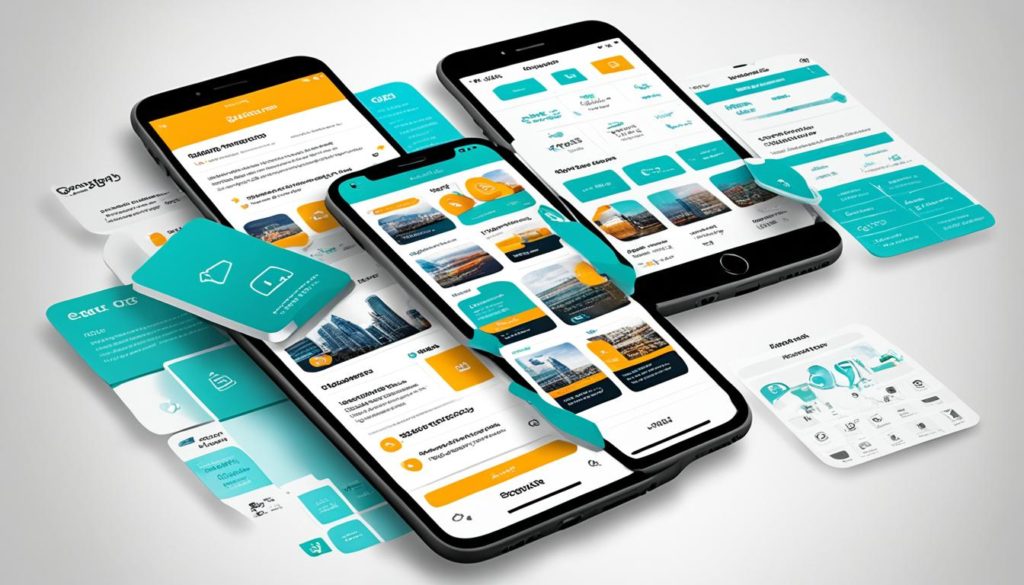
Full Stack Developers earn more in contract work than full-time jobs. This shift is part of a big change in the software development world.
Now, a clear software development agreement is key for successful tech projects. Being a contractor brings Full Stack Developers more money and freedom. But, it takes a smart plan to make the switch work well.
To do well in software development contracting, set a focus area, build a strong portfolio, and network well. Keep up with tech trends, budget wisely, and know the legal side. These steps are crucial to follow local laws.
Succeeding in contracts also means getting better at talking, being flexible, managing time, and learning from feedback. These skills not only help get good contracts but also deal with their unique issues.
Learn more about key strategies for success in software development contracting
Key Takeaways
- Contract work offers potential for higher earnings compared to traditional full-time roles for Full Stack Developers.
- Maintaining a diverse portfolio increases chances of securing contracts in the software development industry.
- Networking is crucial for finding new opportunities in the tech sector.
- Staying updated with the latest trends and technologies is essential to remain competitive.
- Solid financial planning is necessary for managing unpredictable income fluctuations.
Understanding the Importance of Software Development Contracts
Software development contracts are crucial for client-developer relations. They ensure everyone knows the project scope, has legal protection, and understands the financial side. These contracts clearly define the project’s goals, what will be delivered, and the developer’s duties. This clarity builds trust between clients and developers. The contracts also protect both sides legally and financially. They set payment details, warranties, and keep things confidential.
Defining Your Scope of Work
The scope of work is very important in software contracts. It spells out the project’s aims, what will be delivered, and the developer’s jobs. Having this clearly documented stops confusion and keeps expectations on track. A defined scope of work, like in a software development contract example, makes sure the project stays on schedule. This is key to its success.
Ensuring Legal Protection
Legal protection is a key part of software contracts. They include clauses for warranties, liabilities, and who owns the project’s ideas. These rules protect the developer and the client by stating their rights and duties. Also, non-disclosure agreements keep secret info safe. This builds trust between the parties.
Establishing Financial Terms
Setting financial terms clearly is crucial in software contracts. It avoids money troubles. Both sides should clearly understand when and how payments will be made. Knowing these details helps both sides handle their money well. Things like project length, budget flexibility, and what’s included in the work affect costs.
Let me show you the common software service contracts:
| Contract Type | Suitable Scenarios |
|---|---|
| Fixed Cost | Tight budget, clear project documentation, small project duration |
| Time and Materials | Flexible budget, lack of detailed project documentation, willingness to invest time and effort |
| Dedicated Team | Flexible budget, desire for non-standard software functionality, project duration longer than three months |
In the end, software contracts are essential. They ensure a project’s success by detailing its scope, protecting everyone legally, and setting clear finance terms. These agreements are the roadmap for a project, promoting good communication and realistic expectations.
Essential Clauses in a Software Development Agreement
A good software development contract clearly outlines each party’s roles and protects their interests. Let’s explore the important parts of a software development agreement you need to know about.
Key Elements to Include
A proper contract should clearly state the work’s Scope of Work. Most agreements break down projects into phases, often seen in 85% of contracts. They ensure everyone knows what to expect.
It’s vital to set rules for fixing work scope issues, included in 70% of contracts. Projects usually get a 14-day period to test and review before they finish, which is very important.
Using a detailed checklist is very helpful. A software development contract checklist keeps everything in check. It prevents missing essential points, helping the project go smoothly.
Intellectual Property Rights
Intellectual Property Rights (IPR) is key in any software contract. An overwhelming 95% of agreements have the employer owning the software. They also state the developer won’t claim ownership. This protects your unique ideas and encourages new ones without worry.
Confidentiality and Non-Disclosure
A serious contract always has Confidentiality and Non-Disclosure Clauses (NDAs). 100% of them ask developers to keep everything secret for three years. These clauses help keep private info safe and prevent leaks.
| Clause | Percentage | Average Duration |
|---|---|---|
| Scope of Work Breakdown | 85% | 14 Days |
| Remedies for Breach | 70% | N/A |
| Employer Retains IPR | 95% | N/A |
| Developer Won’t Claim IPR | 100% | N/A |
| Confidentiality Obligation | 100% | 3 Years |
| Non-compete Clauses | 80% | 3 Years |
| Hourly Rate Specification | 70% | N/A |
| Additional Benefits | 50% | N/A |
Using a comprehensive checklist ensures a well-rounded agreement. This approach cuts risks, builds trust, and creates a solid foundation benefiting both customer and developer.
How to Choose the Right Software Development Contract Template
Choosing the right software development contract template is key. It protects everyone’s interests. An established template covers all the necessary parts. But, it’s crucial to tweak the template to fit the project’s unique needs.
Reviewing Existing Templates
Starting with a strong template is crucial for a software agreement. It shows us what standard practices and details are usually included. This step helps us focus on important clauses like payment plans and who owns what.
Customizing for Your Needs
Customizing the contract is essential for our specific project. We may need to change the work scope or the payment plans. This ensures everyone knows their role, reducing possible problems and making the project go smoothly.
Here’s a useful comparison table to highlight core elements to consider during customization:
| Element | Description | Importance |
|---|---|---|
| Scope of Work | Defines project goals and deliverables | High |
| Payment Terms | Details payment amounts and schedules | High |
| Timelines | Specifies deadlines and milestones | Medium |
| Intellectual Property Rights | Outlines ownership of the developed software | High |
| Confidentiality | Ensures protection of sensitive information | Medium |
Real-world Examples of Successful Software Development Contracts
Looking at how successful software contracts work helps us learn the best ways. By seeing how both new and big companies handle these deals, we can understand how to grow business, find new ideas, and build good partnerships.
Case Study: Successful Startups
Startups are great examples of using software contracts well. McDonald’s, for example, boosted their sales and loyalty by 50% with self-service kiosks and contactless payments. It’s a clear example of how custom software can change the game for a business. Unilever, too, enhanced their production with custom solutions. They cut costs and saved time, showing how startups can make big improvements with the right software.
Learning from Industry Leaders
Big names like Alibaba have also shown the power of smart software deals. by working with American developers for their website, Alibaba hit global revenue of about $56.152 billion in 2019. This shows the winning strategy of choosing the right partners and contracts. Habeco improved its business with custom software for loyalty programs, boosting sales. These cases highlight the importance of fair software development contractor rights and good negotiations. They teach us how to make contracts that work well for everyone and lead to success in the long run.
FAQ
What is a software development agreement?
It’s a deal between a client and a developer. It spells out the project’s goals, deadlines, and what each side must do. This helps both know what to expect.
Why is defining the scope of work crucial in a software development contract?
It’s important to set clear goals and who does what. This avoids confusion and makes sure everyone knows what they should be doing.
How can we ensure legal protection in our software development contracts?
Including sections about warranties, liabilities, and keeping secrets safe helps. These protect both the client and the developer. They also make it easier to solve disagreements.
What should be included in the financial terms of a software development contract?
It should say when and how the developer gets paid. This clarity helps both sides feel secure about money matters.
What are the key elements to include in a software development contract?
You should cover the work scope, how payments work, who owns what, keeping things secret, and who’s responsible if something goes wrong. These elements set the project’s rules clearly.
Why are intellectual property rights important in software development agreements?
They protect the software’s unique parts. They make it clear who owns what. This is key for both clients and developers.
What is the role of confidentiality and non-disclosure agreements in software development contracts?
They keep secret info, well, a secret. This protects both parties. It ensures important data stays safe.
How do we choose the right software development contract template?
Look at different templates to see what’s commonly used. Then, make it fit your project by changing the details. This includes the work’s scope and when it should be done, who owns what, and how payment works.
What are the benefits of reviewing existing software development contract templates?
It shows you what’s usually included. This helps you make a contract that follows the rules while meeting your project’s specific needs.
How can a software development contract be customized to fit our unique needs?
Add in the details that make your project special. Include unique technical needs, deadlines, who owns what, and how payments are made. This makes the contract right for your project.
What can we learn from real-world examples of successful software development contracts?
Looking at what has worked can teach us a lot. We can learn from how others have made their contracts. This includes how they protect both sides, set clear rules, and make projects succeed.
How do successful startups approach software development contracts?
They focus on making clear, fair contracts. These contracts help build good relationships. This way, everyone wins and new ideas are supported.
Why is it important to learn from industry leaders in software development contracts?
Hearing what works from the experts is valuable. It shows us how to make good contracts that keep everyone happy. This can lead to successful projects and ongoing partnerships.
Future App Studios is an award-winning software development & outsourcing company. Our team of experts is ready to craft the solution your company needs.









